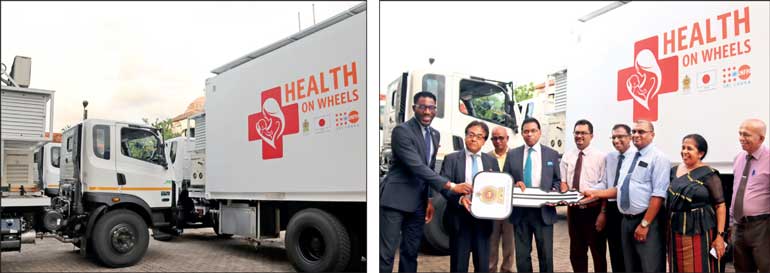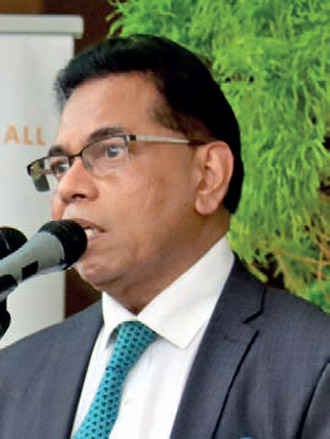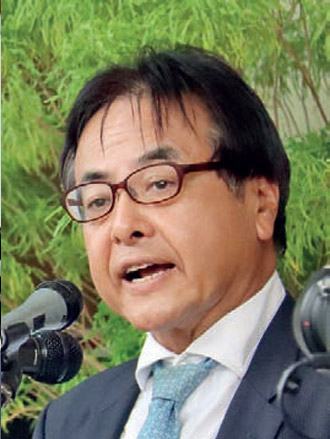Thursday Feb 26, 2026
Thursday Feb 26, 2026
Wednesday, 8 May 2024 00:05 - - {{hitsCtrl.values.hits}}


Health Ministry Secretary Dr. Palitha Maheepala

Japanese Ambassador Mizukoshi Hideaki

UNFPA Representative, Sri Lanka Kunle Adeniyi
Japanese Ambassador Mizukoshi Hideaki on Monday handed over three “Health on Wheels” trucks to the Ministry of Health.
The project has been implemented by the United Nations Population Fund (UNFPA), with financial support from the Government of Japan.
These trucks valued at $ 380,000 represent a vital step in enhancing healthcare accessibility, particularly in the Uva, Central, and Southern provinces.
“Health on Wheels” is a pioneering mobile health unit designed to deliver essential maternal, newborn, and gynaecological services, especially to at-risk women and girls during disasters or emergencies. Additionally, the vehicles will be deployed to remote geographical locations where the required facilities are not available to deliver services. Comprising a solar-powered, all-terrain vehicle and a fully equipped medical compartment, these units ensure uninterrupted service delivery in difficult-to-reach areas.
The Health on Wheels initiative aims to ensure uninterrupted access to quality sexual and reproductive health and rights (SRHR) services, including maternal health, family planning, and well-woman services for women, young people, and people with disabilities.
Through the deployment of these trucks, it is anticipated that women, young people, and people with disabilities will have improved access to lifesaving SRHR services. Additionally, these mobile clinics will contribute to enhancing health literacy and providing vital medical care to isolated communities. The Ministry of Health will ensure a team of dedicated competent healthcare staff will be allocated to each vehicle ensuring comprehensive healthcare services are provided to those in need.
Features: Well-equipped medical compartment including gynaecological examination bed, fetal doppler, and resuscitation equipment; Solar-powered vehicle for independent operation; Disability-friendly design; Retractable canopy for all-weather service; Office furniture and shower cubicle for hygiene maintenance; Generator for continuous power supply; Water purification system and Fire extinguisher for safety.
The official handover of the Health on Wheels trucks marks a significant milestone in UNFPA Sri Lanka’s efforts together with the Government of Sri Lanka and the people of Japan to improve healthcare accessibility, particularly in remote and vulnerable communities. This initiative underscores the commitment of UNFPA Sri Lanka and the Government of Japan to support the health and well-being of all Sri Lankans, especially women, girls, and young persons.
Health Ministry Secretary Dr. Palitha Maheepala said: “I firmly believe in the power of accessibility when it comes to healthcare. This Health on Wheels initiative is not merely about transportation; it’s a lifeline for women, young people, and individuals with disabilities in remote areas of our nation. By mobilising medical trucks equipped with quality sexual and reproductive health services, we’re bridging the gap between healthcare and those who need it most. These mobile clinics signify more than just convenience; they represent our commitment to ensuring uninterrupted access to essential services such as maternal health, family planning, and well-woman services. With dedicated healthcare teams on board, we’re not just reaching communities; we’re delivering comprehensive care, enhancing health literacy, and saving lives.”
Japanese Ambassador Mizukoshi Hideaki said: “Japan has been actively supporting Sri Lanka’s women as a partner country for Women, Peace, and Security. This project will enhance the quality of health services for rural women in Sri Lanka. Japan is committed to supporting women and girls in Sri Lanka across the country.”
UNFPA Representative, Sri Lanka Kunle Adeniyi said: “UNFPA is thrilled to witness the fruition of our collaboration with the Government of Sri Lanka and Japan in launching the ‘Health on Wheels’ initiative. With their solar-powered, all-terrain design and fully-equipped medical compartments, these units are not just means of transportation; they are lifelines for communities in the Uva, Central, and Southern provinces. These mobile units become indispensable in areas where infrastructure is lacking, and geographical barriers hinder access to healthcare facilities. Through this innovative approach, we are ensuring that essential maternal, newborn, and gynaecological services are not just accessible but uninterrupted, even in the most remote and underserved areas. These bridge the gap between isolation and access, ensuring that no woman or girl is left behind in their quest for health and well-being.”